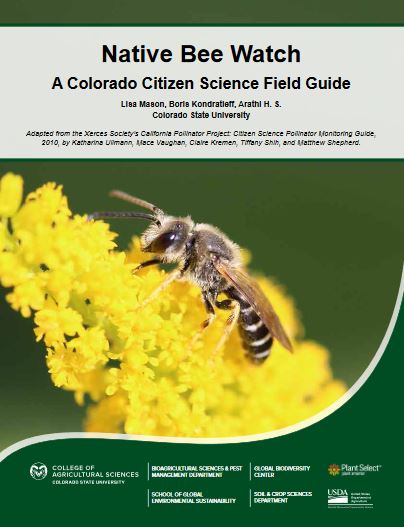 Bees are important to our ecosystem. As pollinators, they are essential to the growth of the fruits and vegetables we eat. But bees are disappearing. Increased urban development means less habitat and fewer of the native plants that bees rely on. Pesticides, disease, and climate change are also factors. So Colorado State University is sponsoring Native Bee Watch, a citizen science program that monitors bee populations in northern Colorado. Program volunteers go out into the field to record sightings of bees, whether they are seen pollinating a flower, and various habits and characteristics. Species are also identified, which can be challenging, as Colorado has over 900 native species of bees!
Bees are important to our ecosystem. As pollinators, they are essential to the growth of the fruits and vegetables we eat. But bees are disappearing. Increased urban development means less habitat and fewer of the native plants that bees rely on. Pesticides, disease, and climate change are also factors. So Colorado State University is sponsoring Native Bee Watch, a citizen science program that monitors bee populations in northern Colorado. Program volunteers go out into the field to record sightings of bees, whether they are seen pollinating a flower, and various habits and characteristics. Species are also identified, which can be challenging, as Colorado has over 900 native species of bees!
CSU’s College of Agricultural Sciences recently published Native Bee Watch: A Citizen Science Field Guide, with information on the project and tips on species identification, habits, and characteristics. Whether you’re interested in volunteering for the program or you just want to learn more about observing bees, check out this handy illustrated guide. You can also find more on Native Bee Watch on their website.
The Colorado Department of Agriculture is also monitoring bee populations, through the National Honey Bee Survey and the Cooperative Agricultural Pest Survey. These surveys monitor bee health, diseases, and the effects of pesticides. In 2017 the department produced a video, How Does Colorado Keep an Eye On Our Bees?, which explains the surveys.
You can help protect Colorado’s bee populations by adding native plants to your garden and creating a welcoming habitat. To learn how, see the following CSU publications:
- Attracting Native Bees to Your Landscape
- Creating Pollinator Habitat
- Feeding Honey Bees in Colorado (includes information on feeding in winter)
- Gardening for Bees – or Not!
- Relating Ranking of Ornamental Flower Plants to Foraging Honey Bees
For more information about bee biology and identification, see the University of Colorado Museum’s publication The Bees of Colorado as well as CSU’s publication Summary of Biology of Some Common Bees and Wasps.
- How to Spot the Differences Between Eagles and Hawks - August 16, 2021
- How Transportation Projects Help Tell the Story of Colorado’s Past - August 9, 2021
- Time Machine Tuesday: The Night the Castlewood Canyon Dam Gave Way - August 3, 2021